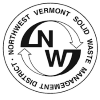Scrap metal is accepted for recycling at NWSWD Facilities in North Hero and Georgia. Fees for scrap metal range from $1.00 – $20.00 per item..
Scrap metal includes most bicycles, desks, filing cabinets, book shelves, barbeque grills, lawn furniture, lawn mowers or car parts (drained of ALL fluids see above), doors, windows, screens (remove glass panes if possible), nails, nuts, or bolts, siding or roofing material, and any item that is at least 80% metal. The type of metal is not important. Even electrical wiring contains metal that can be recycled and may be placed in the scrap metal bin.
Other items accepted as scrap metal at the locations listed above:
Helium tanks: Release all the remaining helium. Once you are confident the tank is empty or no longer under any pressure, remove the valve. We can then accept it as scrap metal for a $3.00 fee.
For commercial quantities of scrap metal there are several area scrap metal recyclers. Please contact them directly with any questions regarding large quantities of scrap metal ( see below):
Hodgdon’s Scrap Yard – (802) 868-7280 Swanton
Rathes Salvage – (802) 655-0651 Colchester
Earth Waste – (802) 775-7722
St.Albans City Garage St.Albans City
